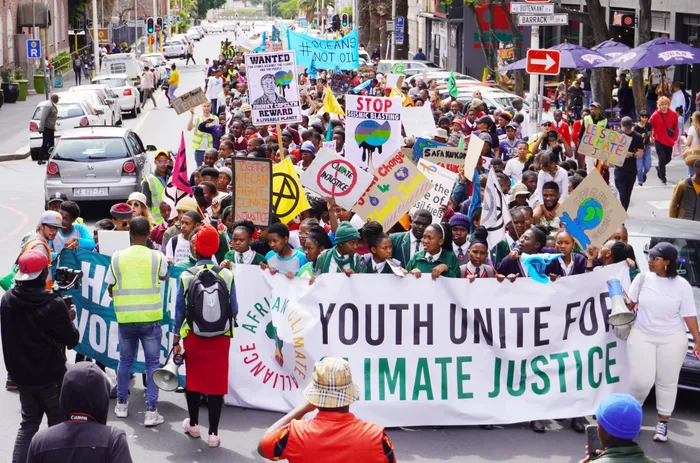Climate change exacerbating South Africa’s triple challenges

A file picture of a protest in Cape Town highlighting the dangers of climate change. Picture: Tracey Adams - African News Agency (ANA)
Blessing Manale
This article is an overview of the Just Transition Framework that has been adopted by Cabinet.
South Africa is one of the most unequal countries in the world; the divide between the rich and the poor is larger than ever. Currently, the unemployment rate, at more than 35%, is at a record level.
Climate change exacerbates our triple challenges of poverty, unemployment and inequality.
South Africa is in a part of the world that is severely affected by climate variability. The country frequently experiences drought, flooding and other extreme weather events, with evidence that the frequency and intensity of such events is increasing because of climate change.
Addressing climate change means strengthening adaptation measures to improve the resilience to immediate events (eg extreme weather disasters) as well as long-term climatic shifts that affect water security, food security and human health with a particular focus on vulnerable groups, particularly rural communities, the poor, women, the youth and children.
Tackling climate change will require urgent, significant and transformational changes across all sectors of the economy.
It will require innovations in urban and infrastructure planning, a massive shift to clean energy sources, and changes to how we use our land and water and obtain our food.
The years ahead will be marked by steadily increasing global mean temperatures, with associated physical impacts, alongside the increasing urgency of the global mitigation response.
In the next few years, the global energy transition will accelerate, with increasing pressure on disinvestment in fossil fuels.
A just transition aims to achieve a quality life for all South Africans, in the context of increasing the ability to adapt to the adverse impacts of climate, fostering climate resilience and reaching net-zero greenhouse gas emissions by 2050, in line with the best available science.
A just transition builds the resilience of the economy and people through affordable, decentralised, diversely owned renewable energy systems, the conservation of natural resources, equitable access to water resources, an environment that is not harmful to one’s health and wellbeing, and sustainable, equitable, inclusive land use for all, especially for the most vulnerable.
The coal value chain in South Africa faces one of the earliest disruptions in the global transition towards reaching net-zero emissions.
Demand for coal for electricity and exports shrank in the 2010s and is expected to decline further in the long term as countries reduce their greenhouse gas emissions – the current driver for coal demand is not sustainable. This will create significant risks in South Africa, including revenue loss from reduced coal exports; job losses across the coal value chain; and loss of the economic ecosystems around coal mining communities, potentially creating ghost towns without effective economic diversification.
The changes will be difficult for some, particularly the workers and communities whose lives and livelihoods are tied to fossil fuel industries, as well as women, youth and the poor, who are already disproportionately bearing the brunt of South Africa’s hardships and triple challenges.
Coal production requires a significant amount of water and climate change is likely to increase water scarcity and competition throughout the south. Mining operations for coal and other products are also vulnerable to increased temperatures and extreme weather events.
With appropriate planning and support, some of the job losses in the coal value chain can be offset by further development of the domestic renewable energy manufacturing industry.
As the transition accelerates in the period 2025-2030, very rapid investment will require new transmission lines and technologies for power generation and storage.
More reliable and cheaper electricity will promote a more sustainable economy and job creation, while there will be growing international and domestic markets for e-vehicles and other technologies to reduce emissions and improve resilience, which investments will seek to diversify economies in coal-dependent communities; and there is the prospect of greater urban densification that reduces commuter and labour costs and increases housing demand, thus creating new economies.
Beyond 2030, there will be a more affordable and reliable electricity system and other innovative investments, which lays the basis for a more dynamic, diversified and equitable economy.
It is in South Africa’s national interests to join the world in combating climate change, in accordance with national circumstances and development priorities.
This is not only an environmental imperative, but an economic one, too, as countries around the world start to shift toward low-emissions policies, affecting global trade as well as demand for goods and resources.
For now, let us build a social compact for a just transition.
* Manale is head of communications and social engagement at the Presidential Climate Commission.
** The views expressed do not necessarily reflect the views of IOL or Independent Media.
Pretoria News